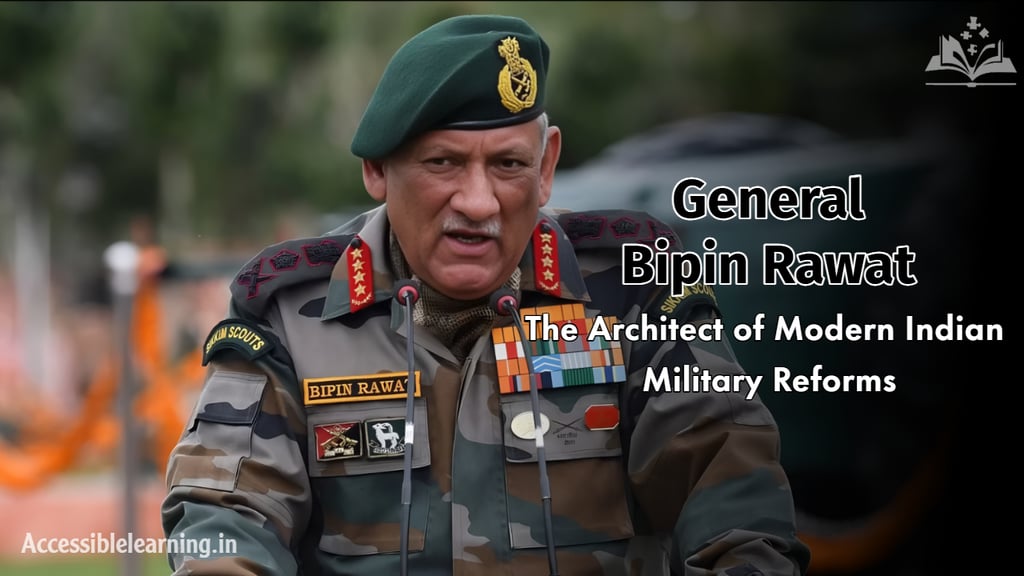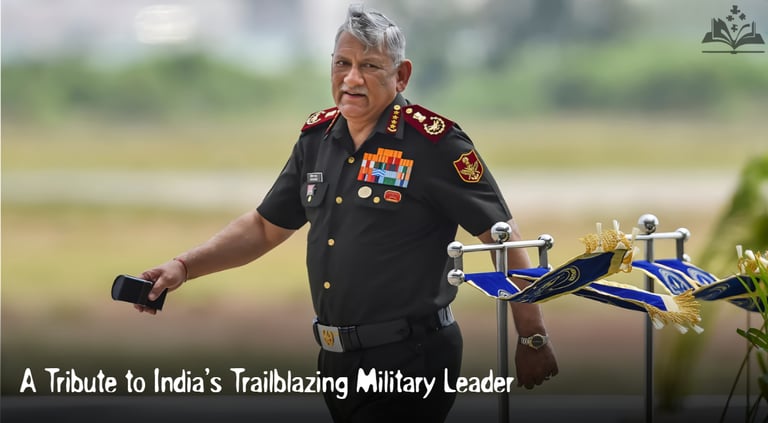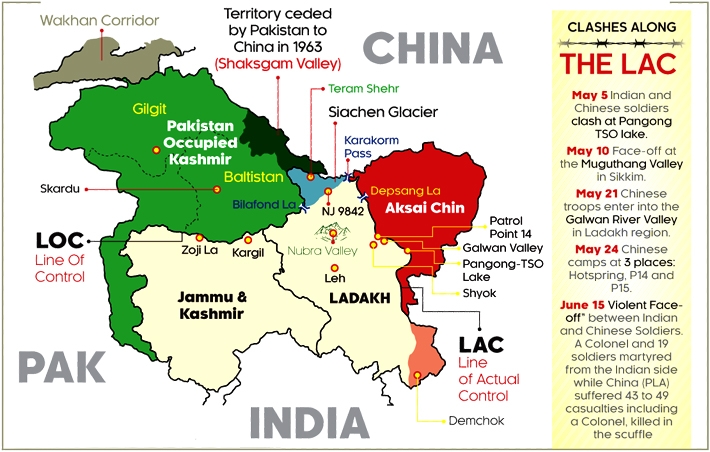
Bipin Rawat: A Visionary Military Leader and Reformer?!
Blog post description.Explore the life and legacy of General Bipin Rawat, India's first Chief of Defence Staff. Learn about his remarkable military career, visionary reforms, leadership during critical moments, and his lasting impact on India's defense capabilities.
THE GREAT LEADERINDIA/BHARATARMY/NAVY/AIRFORCEBIOGRAPHYEDUCATION/KNOWLEDGE
Sachin K Chaurasiya
12/3/20247 min read


General Bipin Rawat (जनरल बिपिन रावत जी), India’s first Chief of Defence Staff (CDS), stands as a symbol of exemplary leadership and strategic innovation in modern military history. Known for his bold decisions, forward-thinking reforms, and deep understanding of warfare, General Rawat left an indelible mark on India’s defense forces. This article offers an in-depth look into his life, career, contributions, and legacy.
Early Life and Inspiration
Born on March 16, 1958, in Sainj, Pauri Garhwal, Uttarakhand, Bipin Rawat grew up in a family with a proud military tradition. His father, Laxman Singh Rawat Ji (लक्ष्मण सिंह रावत), served as a Lieutenant General, instilling a sense of duty and discipline in him from a young age.
Rawat’s early education in Cambrian Hall, Dehradun, and St. Edward’s School, Shimla, paved the way for his military aspirations. He excelled academically and physically, traits that later defined his stellar career. His admission to the National Defence Academy (NDA) marked the beginning of his military journey, culminating in his graduation from the Indian Military Academy (IMA), Dehradun, where he received the Sword of Honour, a distinction awarded to the best cadet.
Educational Achievements
General Rawat’s academic pursuits reflected his deep interest in defense strategy and leadership.
University of Madras: MPhil in Defense Studies, emphasizing strategic and international security challenges.
US Army Command and General Staff College: Specialized training in military operations and command.
Doctorate: A PhD on "Internal Security and Leadership" underscored his theoretical understanding of insurgency and governance.
His educational background uniquely positioned him to address complex security challenges with a blend of theoretical knowledge and practical experience.
A Stellar Military Career
General Rawat was commissioned into the 5th Battalion of the 11 Gorkha Rifles on December 16, 1978. Over his 43-year-long career, he held critical command, staff, and instructional appointments across diverse terrains and challenges.
Counter-Insurgency Operations
Rawat’s leadership in counter-insurgency operations, particularly in Jammu & Kashmir and the North-East, earned him widespread respect. His tenure as the Major General of the Rashtriya Rifles and Corps Commander in Dimapur significantly reduced insurgency through strategic planning and community engagement.
High-Altitude Warfare Specialist
Rawat served in challenging terrains such as Sikkim, Arunachal Pradesh, and the Line of Actual Control (LAC). His expertise in high-altitude warfare made him a vital asset during border conflicts with China.
Notable Commands
Brigade Commander: Led a brigade in the United Nations peacekeeping mission in the Democratic Republic of Congo. His leadership during intense conflict earned him accolades for professionalism and humanitarian focus.
Southern and Eastern Commands: Played key roles in securing India’s borders with Pakistan and China.

Chief of Army Staff (2016–2019)
Appointed as the 27th Chief of Army Staff (COAS) on December 31, 2016, General Rawat focused on modernizing the Indian Army to address evolving security threats.
Surgical Strikes (2016): Under his leadership, India conducted surgical strikes across the Line of Control (LoC) in response to the Uri terrorist attack. This bold move demonstrated India’s new proactive stance against terrorism.
Modernization Drive: Advocated for the integration of advanced weaponry and technology to enhance combat efficiency.
Structural Reforms: Streamlined decision-making processes, reduced redundancy, and improved operational efficiency.
First Chief of Defence Staff (2020-2021)
As India’s first CDS, General Rawat’s role extended beyond traditional military boundaries.
Creation of the Department of Military Affairs (DMA)
Rawat was instrumental in establishing the DMA, a move aimed at improving coordination among the Army, Navy, and Air Force.
Theatre Command System
Advocated for the creation of integrated theatre commands, where all three services operate under a single commander to improve operational efficiency and reduce duplication.
Indigenization Efforts
Strongly supported the Make in India initiative for defense manufacturing. Under his guidance, India accelerated indigenous production of weapons, reducing dependency on imports.
Focus on Cyber and Space Warfare
Acknowledging the importance of emerging domains, Rawat emphasized building capabilities in cyber warfare, space technology, and artificial intelligence to prepare for future conflicts.
Recognition and Awards
Throughout his illustrious career, General Rawat received numerous awards and honors for his service.
Param Vishisht Seva Medal
Uttam Yudh Seva Medal
Ati Vishisht Seva Medal
Yudh Seva Medal
Sena Medal
Vishisht Seva Medal
These honors underscore his significant contributions to India’s security and military advancements.
Tragic End and National Mourning
On December 8, 2021, General Bipin Rawat, his wife Madhulika Rawat, and 11 other personnel lost their lives in a tragic helicopter crash near Coonoor, Tamil Nadu. The Mi-17V5 helicopter, which was en route to the Defence Services Staff College in Wellington, crashed due to adverse weather conditions.
The loss of General Rawat was a devastating blow to India. A state funeral with full military honors was held in New Delhi, attended by thousands, including top military and political leaders. Tributes poured in from across the globe, reflecting his impact on global military strategy and diplomacy.


Career Milestones
General Rawat’s four decades of service in the Indian Army saw several groundbreaking milestones:
United Nations Peacekeeping Missions
As a brigadier, he commanded a multinational brigade during the United Nations peacekeeping mission in the Democratic Republic of the Congo (MONUC). His leadership during intense combat situations earned him the Force Commander’s Commendation, reflecting his ability to lead in complex international environments.
Mountain Warfare Expertise
Rawat’s specialization in high-altitude warfare and experience along the Line of Actual Control (LAC) made him a key figure during heightened tensions with China. His leadership ensured preparedness during events like the Doklam standoff in 2017, where diplomacy and strategy combined to safeguard Indian interests.
Kashmir and North-East Operations
General Rawat's tenure in Jammu & Kashmir saw innovative counter-insurgency measures that combined military precision with civilian outreach. Similarly, his experience in the North-East was instrumental in combating insurgent groups and fostering stability in volatile regions like Nagaland and Manipur.
2016 Surgical Strikes
One of the most notable operations during his tenure as COAS was the 2016 surgical strikes against terror launchpads in Pakistan-occupied Kashmir (PoK). This operation demonstrated a new doctrine of proactive engagement and served as a message of India’s resolve against terrorism.
Balakot Air Strikes (2019)
Although primarily attributed to the Indian Air Force, General Rawat’s coordination among the services and his emphasis on jointness played a crucial role in the success of the Balakot airstrikes following the Pulwama attack.


Reforms as Chief of Defence Staff
Appointed as India’s first Chief of Defence Staff (CDS) on January 1, 2020, General Rawat held one of the most critical roles in India’s defense apparatus.
Theatre Commands
Advocated for establishing theatre commands, where resources of the Army, Navy, and Air Force would be pooled under unified operational structures.
Proposed key formations, such as the Air Defence Command and Maritime Theatre Command, aimed at better coordination and resource optimization.
Strengthening Border Security
Rawat prioritized countering growing threats along the northern and western borders, especially amid China’s aggressive posturing in Ladakh and Pakistan’s continued proxy war through terrorism.
Cyber and Technological Advancements
Advocated for investment in emerging areas like cybersecurity, artificial intelligence, and drone technology.
Championed the development of indigenous weapons systems to make India self-reliant.
Welfare of Armed Forces
He worked to ensure better facilities for armed forces personnel and their families, focusing on modernizing living conditions, healthcare access, and education for army dependents.

Global Military Diplomacy
General Rawat played a pivotal role in bolstering India's ties with global partners.
Strengthened India-US defense relations, particularly through joint exercises like Yudh Abhyas and Malabar, which underscored India’s role in maintaining regional stability.
Enhanced military cooperation with Russia, Israel, and France, focusing on defense procurement and technological collaboration.
Engaged with Quad members (the US, Japan, and Australia) to reinforce India's strategic posture in the Indo-Pacific region.
Personal Traits and Leadership Style
General Rawat’s leadership style was marked by pragmatism, decisiveness, and a deep sense of duty. Known for his straightforward and often candid remarks, he was unafraid to address tough questions and offer bold solutions.
Empathetic Commander: Despite his firm military demeanor, he was known for his empathy toward soldiers and their families. His frequent visits to border posts to interact with troops showcased his hands-on approach.
Visionary Strategist: His ability to foresee the changing nature of warfare, particularly hybrid warfare involving cyber threats and proxy elements, set him apart.
Memorialization
After his untimely demise, General Rawat’s contributions were commemorated in numerous ways:
Roads and Institutions Named in His Honor
Several state governments renamed roads and institutions after him to honor his legacy, including a key road in Delhi Cantonment.
Statue and Memorial
A statue of General Rawat was unveiled in Uttarakhand, symbolizing his contributions to the nation. Plans for a larger memorial in his hometown are underway.
CDS Bipin Rawat Foundation
Efforts are being made to establish a foundation focusing on military reforms, education for underprivileged children, and support for army veterans.
Broader Contributions to Nation-Building
Swachh Bharat Abhiyan (Clean India Mission): Promoted cleanliness drives within military cantonments and encouraged soldiers to participate in national campaigns.
Skill Development for Veterans: Advocated for skill-training programs to help retiring soldiers transition into civilian professions seamlessly.
Legacy and Impact
General Bipin Rawat’s contributions continue to influence India’s defense policies.
Military Reforms: His push for modernization, jointness, and self-reliance is shaping the Indian Armed Forces for future challenges.
Inspirational Leadership: Rawat’s decisive yet empathetic leadership style serves as a guiding principle for the armed forces.
Visionary Outlook: His foresight in addressing cyber threats, space warfare, and geopolitical challenges places India on a stronger global footing.


General Bipin Rawat Ji’s life was not just about defending India’s borders but about shaping its future as a global power. His strategic foresight, leadership, and reforms have left a legacy that continues to guide India’s armed forces.
As India forges ahead in a complex geopolitical landscape, the blueprint laid by General Rawat serves as a beacon of strength and resilience. He remains an enduring inspiration, embodying the values of courage, integrity, and vision that define the spirit of India.
Subscribe To Our Newsletter
All © Copyright reserved by Accessible-Learning Hub
| Terms & Conditions
Knowledge is power. Learn with Us. 📚


